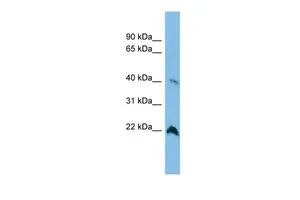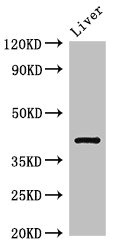
WB analysis of A549 cells using GTX45345 TGDS antibody at 0.2-1microg/ml.
TGDS antibody, Internal
GTX45345
ApplicationsWestern Blot
Product group Antibodies
TargetTGDS
Overview
- SupplierGeneTex
- Product NameTGDS antibody, Internal
- Delivery Days Customer9
- Application Supplier NoteWB: 0.2-2.5 ug/ml. *Optimal dilutions/concentrations should be determined by the researcher.Not tested in other applications.
- ApplicationsWestern Blot
- CertificationResearch Use Only
- ClonalityPolyclonal
- Concentration0.5-1 mg/ml
- ConjugateUnconjugated
- Gene ID23483
- Target nameTGDS
- Target descriptionTDP-glucose 4,6-dehydratase
- Target synonymsCATMANS, SDR2E1, TDPGD, dTDP-D-glucose 4,6-dehydratase, growth-inhibiting protein 21, short chain dehydrogenase/reductase family 2E, member 1
- HostRabbit
- IsotypeIgG
- Protein IDO95455
- Protein NamedTDP-D-glucose 4,6-dehydratase
- Scientific DescriptionThe protein encoded by this gene is a member of the short-chain dehydrogenases/reductases (SDR) superfamily, and is thought to contain a nicotinamide adenine dinucleotide (NAD) binding domain. This large SDR family of enzymes is involved in the metabolism of a variety of compounds, including prostaglandins, retinoids, lipids, steroid hormones, and xenobiotics. Mutations in this gene have been associated with Catel-Manzke syndrome, which is characterized by Pierre Robin sequence, and radial deviation of the index finger due to the presence of an accessory bone between the index finger and its proximal phalanx. Pierre Robin sequence is defined by an undersized jaw, backwards displacement of the tongue base that causes an obstruction of the airways, and can also be associated with a cleft palate. Alternative splicing results in multiple transcript variants. [provided by RefSeq, Jan 2015]
- Storage Instruction-20°C or -80°C,2°C to 8°C
- UNSPSC12352203



